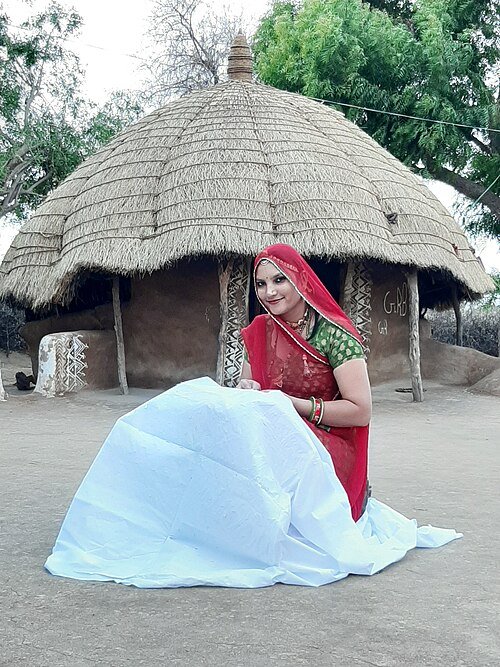How Ruma Devi Turned Embroidery Into Women’s Empowerment.

A few months ago, over coffee, a friend confided in me about her corporate job. “I feel trapped,” she said. “I can’t even think about leaving because I don’t have any real skills. What would I even do?” I remember feeling a pang of sadness, not just for her, but for all of us who underestimate the skills we already possess.
That’s why I decided to share this week’s story, which is a reminder that sometimes, the most transformative skills aren’t learned in boardrooms or classrooms. Sometimes, they’re passed down by a grandmother’s loving hands.
Ruma Devi‘s life reads like a Bollywood script, except it’s painfully, beautifully real. She lost her mother at two, was forced to drop out of school in the eighth standard, married at 17, and then faced the unimaginable, losing her baby.
“I reached a point where I felt like giving up,” she recalls.
In those dark times, she remembered something precious: her grandmother had taught her kashidakari, a traditional embroidery art. She picked up her needle and thread again, and embroidery became her refuge. “The kashidakari art my grandmother taught me became my light in dark times,” she says.
Ruma Devi’s life changed with ₹20
Ruma’s first sale was a handmade bag. She earned ₹70—₹50 went back into materials, leaving her with a ₹20 profit. That twenty-rupee note wasn’t just money; it was validation. It was proof that the skill she’d learned as a child, the craft considered just a “hobby” in Barmer’s households, could be her lifeline.
But here’s where Ruma’s story transcends personal success and becomes a movement. She didn’t just save herself, she went door to door, encouraging other women in her conservative Rajasthani village to work. Starting with just 10 women who pooled their money to buy a single sewing machine, she built what would become a network of over 30,000 artisans.
Breaking Every Barrier
Coming from a society where women aren’t breadwinners, Ruma faced opposition from every corner.
“Initially, I had no support from my family and had to build everything from scratch,” she shares.
She could only speak Marwari, which became her biggest barrier when stepping outside her village. But she learned Hindi, gained confidence, and lived by one powerful mantra: never pay attention to naysayers.
Today, she works from 9 am to 10 pm when she’s not travelling, spending most of her time at the training centre keeping women’s spirits high. And in a beautiful touch that speaks to her leadership style, she personally prepares gifts for women in her collective who are getting married, small gestures that strengthen their bond as a community.
From Barmer to Harvard
When Ruma received an invitation to speak at Harvard University, she initially declined. “Having never studied beyond the eighth grade, it felt like something beyond my wildest dreams,” she explains. But when an organisation stepped in to cover her travel expenses, she leapt.
Picture this: a woman who dropped out in eighth grade, standing before Harvard students, teaching them how to hold a needle and thread. “When the university students picked up a needle and thread, and I had the chance to teach them basic embroidery, I felt immense pride,” she says. It was her greatest achievement—representing her country, her culture, and proving that knowledge comes in many forms.
The Ripple Effect of Empowerment
Ruma’s work at Gramin Vikas Evam Chetna Sansthan goes beyond teaching embroidery. She helps women understand billing, identify buyers, package products, and use social media for visibility. The collective’s products, crafted using natural dyes, have been showcased in Germany and at Lakme Fashion Week. She’s appeared on Kaun Banega Crorepati, was named Designer of the Year in 2019, and received the Nari Shakti Puraskar, India’s highest civilian honor for women, from then-President Ram Nath Kovind.
But her proudest moments come from stories like Sugni Devi’s. “She came to me with only one skill, embroidery. Today, she not only supports her family but also travels to different cities and colleges to train students. She has sent all four of her children to school.” For Ruma, this proves that “one woman can empower her entire family.”
Living Her Philosophy
Every evening at the training centre, the women sing bhajans together, sometimes inviting folk artists to perform. Ruma meditates when she feels low and finds comfort in bajra ki roti with kadhi, chutney, and chaas. And in a beautiful act of daily resistance and pride, she always wears handwoven clothes, honouring her craft and the hard work of the women in her community.
What We Can Learn
Ruma’s message to women, especially those who feel they lack skills or come from small villages, is simple but powerful: “If I can do it, so can you. The key is to have confidence in your skills and start with whatever resources you have. Once you take that first step, everything else follows.”
Her life philosophy? “Just try once—you never know what you’re capable of until you give it a shot.”
So to my friend who feels trapped, and to anyone reading this who underestimates what they already know, your skills matter. That hobby, that traditional knowledge, that thing you learned from your grandmother or mother, that passion project you’ve been dismissing as “not real work”, it could be exactly what transforms not just your life, but the lives of thousands of others.
Ruma Devi picked up a needle in her darkest hour and stitched together a revolution. What could you create if you truly believed in the skills you already have?
What’s your takeaway from Ruma Devi’s story? Have you been underestimating a skill that could be your superpower? Share your thoughts in the comments below.
Need more inspiration to start your journey of success, self confidence, satisfaction, or finding yourself, check these stories of amazing women who believed on themselves and followed their heart.
